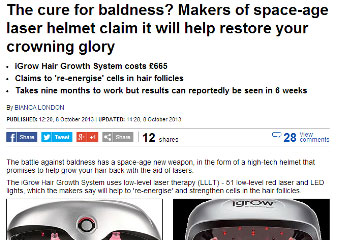
Has the cure for baldness finally been discovered?
HAIR LOSS
Mail Online
The battle against baldness has a space-age new weapon, in the form of a high-tech helmet that promises to help grow your hair back with the aid of lasers.
The iGrow Hair Growth System uses low-level laser therapy (LLLT), which the makers say will help to ‘re-energise’ and strengthen cells in the hair follicles.
The average person using iGrow will apparently first start to see less hair loss after six to eight weeks and the full effect after nine months.
The iGrow claims to have no side effects, but a fresh head of hair doesn’t come cheap – the iGrow is priced at £665.
This does, however, seem more reasonable than a full hair transplant, which can cost between £4,000 – £30,000.
Speaking about the futuristic device, Dr hair transplant surgeon at The Private Clinic of Harley Street, said: ‘Low level laser therapy (LLLT) is a safe form of light treatment which has long been explored as a potential resolution to genetic forms of hair loss common in men and women, like androgenetic alopecia or pattern balding.
‘It is intended for men and women with thinning hair or pattern baldness caused by a hereditary condition, and not by any other form of hair loss.
‘This technology is not particularly new; it is something that has been around for many years in different forms. For example, for many years now I have recommended certain patients (both men and women) use a laser comb, which is a very similar device to the IGrow Hair Growth System.
‘A laser comb like this also works with LLLT technology, but is a much smaller device. From the patients I have seen who have gone on to use the system, I can see that it can offer some positive effects when used in conjunction with a product which stimulates hair growth like Regaine.
‘However, it is very unlikely that a patient who is losing their hair will see any form of major restoration by using the device. It may cause some of the thin hair on the patient’s head to look slightly thicker and healthier, but the patient is unlikely to see any form of actual re-growth.
‘Before investing in a system like this, it is important that the man or woman understands exactly what is causing their hair loss; something which a hair loss specialist will be able to determine.
‘Investing in a device like this may offer no long-term solution at all to the patient and it should not be viewed as a viable long-term hair restoration method.’








